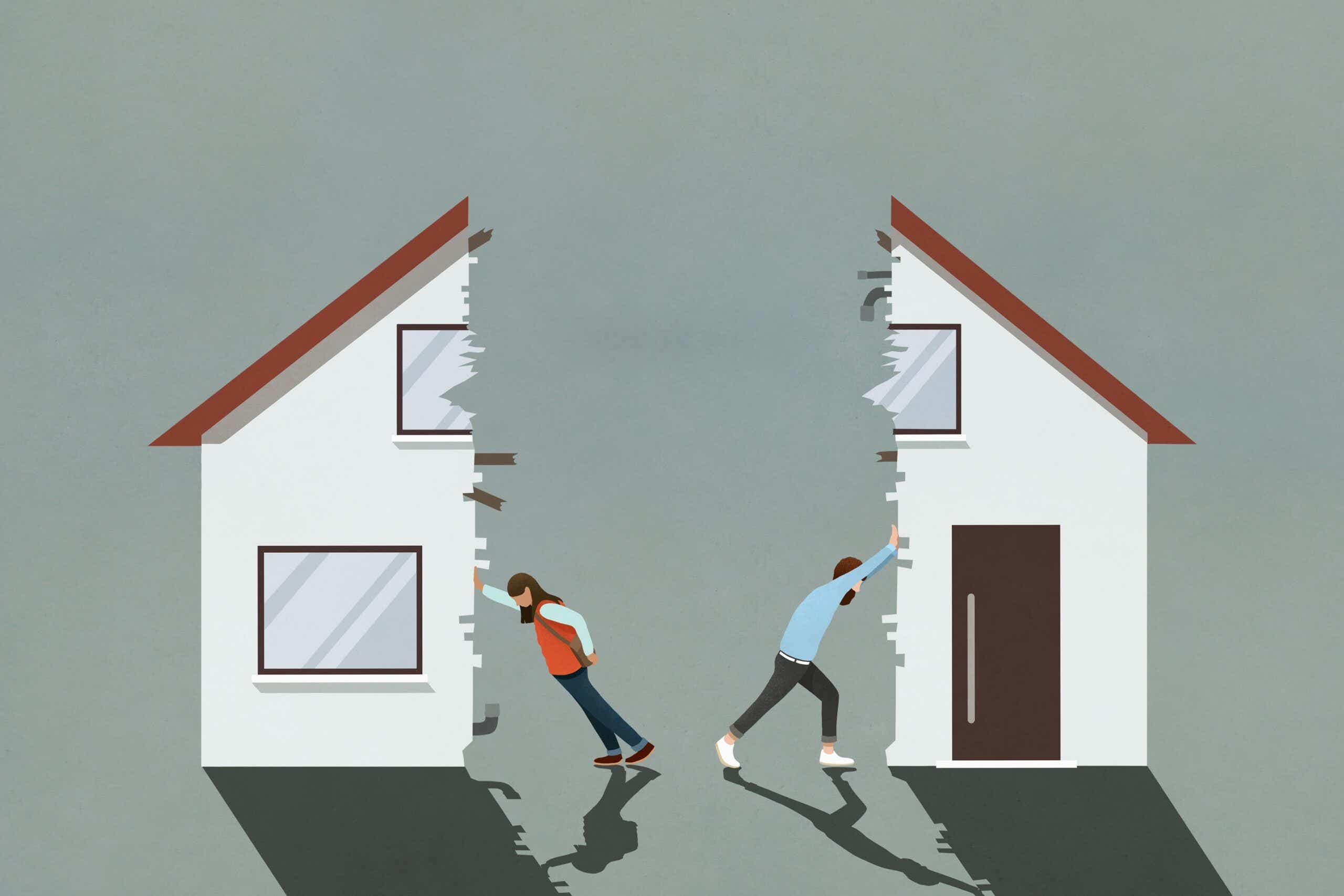Even the most heated arguments don’t have to result in a breakup.
We can all agree: Relationships are hard. At their best, they make us feel complete and supported, but getting to that place of bliss — and staying there — is no easy feat.
It’s totally normal to experience ups and downs with your partner, but the important thing is how you handle the hardships. Willingness to confront problems head-on and be forthcoming about your own flaws, as well as your mate’s, is essential for long-lasting love.
One of the most effective ways to achieve that is with the help of a couples therapist. A neutral third party with training in how our brains work can observe the things you’re too close to see yourself and help you better understand your partner. A therapist isn’t a referee who will decide who’s right, but they can offer practical tools to work on your recurring relationship woes.
For insight into the process, we spoke to Tamekis Williams, a Georgia-based clinical social worker and therapist and the founder of Real Life Solutions, who shares her favorite strategies for tackling the most common problems couples face.
What if I’m unsatisfied with our sex life?
There’s a lot to parse through when it comes to sex in committed relationships, and in her work with clients, Williams has seen many different ways it can become a point of contention.
It’s common for the physical spark to begin to fade as the years go by and monotony creeps in. And for older couples, the way sex ebbs and flows over time is often less about emotion and more about their changing bodies. Menopause, medications, or procedures that limit mobility (like a hip replacement) can make it difficult to maintain an intimate relationship.
But struggles in the bedroom don’t discriminate by age. Having a baby or just the general chaos of juggling responsibilities at work and home may require couples to sacrifice spontaneity and schedule time for sensuality. Disagreements about money or even social media — something like “you keep liking her pictures,” Williams said — can also become roadblocks. And for many, sexual trauma in their past makes a physical connection deeply complicated.
So what can couples do to get their passion back?
Williams helps clients through a process called sensate focus, which teaches partners to reacclimate themselves to shared physicality. “You start slow,” she said. “You start with touch and learning how to be intimate outside of the bedroom and get used to your partner’s hand on you again.”
It’s a three-stage process in which intercourse and orgasms don’t come into play until the end. The bulk of the work “is simply about reconnecting with touch, reconnecting with spending quality time together, reconnecting with building that emotional connection.”
Another strategy is charting a “love map,” a process in which couples ask one another everything from “What’s my shoe size?” to “What is my biggest fear?” Williams likes to amplify the results by turning it into a date night — “let’s get some food, let’s get some drinks, let’s get some lights dimmed and some music playing” — and gamifying it so each partner earns points for correct answers.
She saw firsthand how effective this can be when one of her couples played this game the night before an appointment. The wife won, earning the prize of a massage from her husband the next morning.
“When they came in, they were like, ‘We’re so sorry, we’re a little late, but it’s your fault.’ I was like, ‘Excuse me?’” Williams said. “That massage ended up leading to intimacy, so they were late to the session because they were in session — at home.”
How can we move forward after infidelity?
Once cheating happens, there’s an obvious question: Should you stay or leave? Williams said most clients who seek her help have already decided to stay, and they’re seeing a therapist to figure out how to repair the relationship and move forward.
But even with that resolve to work things out, the task is complicated. That’s because in most cases, infidelity is a symptom of deeper problems. At Williams’s practice, “I’ve only had two clients who said, ‘Honestly, I just [cheated] because the situation presented itself,’” she said.
Her strategy for unpacking that stew of pre-existing conflict is to focus her work on the five years that preceded the adultery, investigating the feelings of disillusionment and dissatisfaction that eventually bubbled up into unfaithful acts.
But the dynamic within the relationship is only part of the equation. Personal issues that color the way they interact with the world are always at play. For example: “We do have people who are people-pleasers and who seek validation from others, and sometimes that can create the environment for infidelity as well,” Williams said.
In cases like that, she often recommends individual therapy to sort through those external factors that aren’t directly influenced by one’s partner. Individual work is also helpful for the person who’s been cheated on, who may second-guess themselves as they internalize feelings of not being enough for their mate physically or emotionally.
Just as important as analyzing the past is preparing couples for what comes after infidelity — even years later.
“Oftentimes, the person who committed the infidelity, initially they’re sorry and they want to do whatever they can in order to heal their spouse, but then it gets to a point where it’s like, ‘OK, so when are we going to move past this?’ They may not understand their spouse is being triggered in different ways,” Williams said. “When it comes to healing, you have to stay open — not just right now, but even five years from now. If that third person just happens to show up, or something reminds that spouse of the infidelity, you have to still be just as endearing then as you are now.”
Why can’t we stop arguing about money?
Each person’s highly specific relationship to money begins to form in early childhood, and fundamental differences in financial philosophies can have serious ramifications in relationships years later. It’s especially challenging when one partner comes from a family where money was always a worry.
“I’ve had a couple of clients where one of the spouses grew up in poverty, and they have a fear of returning to poverty,” Williams said. “So they will save every penny, to the point where the family doesn’t have the opportunity to live, meaning there are no family vacations, you’re barely getting out and doing family activities together. This person is just paying bills, taking care of the necessities, but no wants are being handled.”
Individual diagnoses also play a role in what happens to a couple’s cash. Williams has experience with clients whose bipolar disorder had financial implications. “Mania can show up in different ways,” she said. “For some people, it can be substance abuse, for some people it can be sex, and for some people, it can be spending.”
Differing strategies for saving or even something as simple as maintaining separate bank accounts can cause conflict, particularly when one person brings in more money than the other, leaving their mate with fewer personal funds once bills and collective household expenses are paid.
To sort through these issues, Williams puts the work on paper. She uses spreadsheets and budget handouts to help the couples understand their own finances and how they can move forward in tandem to align their visions. One of her favorite strategies uses “play cards” to create a concrete illustration of their discretionary income.
“You have taken both of your checks, you’re putting it in one checking account, you’re paying your bills, you’re putting away savings, and whatever money is left, they divide that money onto their play cards, and then they can spend that money however they want,” she said.
Even if you’re lucky enough to avoid these problems, therapy can still help
You don’t have to have one of these issues — or any specific issue — to benefit from couples counseling. Williams says a deep and thoughtful assessment of not only a particular relationship but one’s history with love, in general, can make a world of difference in their interactions with their partner.
“You have some couples who just want to be proactive and feel like, ‘You know what, I’ve never really had a committed relationship that worked,’ and so they just want to learn how to have a healthy relationship, how to communicate in a healthy way, how to be supportive,” she said.
Another increasingly popular approach is premarital therapy for couples who want help having an open dialogue to set the stage for a union that will last for decades. “They want to sit down and make sure that they’re compatible, that they are making the right decision,” Williams said.
No matter the reason for it, Williams says working with couples is one of the most rewarding parts of her practice because it allows her to experience the positive transformation that comes to partners who commit to truly understanding and supporting one another.
“I absolutely love couples therapy because I am a believer in love, and so I really love it when I watch my couples fight for their love and not be so quick to give up on it,” she said.













